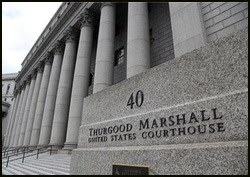
Monday’s Supreme Court decision in Sessions v. Dimaya, striking down a statute as void for vagueness, bolsters Knife Rights’ Federal Civil Rights lawsuit against New York City and District Attorney Cyrus, Vance, Jr. As with our lawsuit, the key issue in that decision was that even though some conduct is clearly covered by the statute, it would be largely impossible for anyone to predict what was illegal in every instance. Plaintiff’s attorney has submitted a 28.j Notice of Supplemental Authority to the Court of Appeals for the Second Circuit notifying them of this important relevant decision.
The problem is nowhere illustrated better in our case than the testimony of ADA Dan Rather, Jr. in which he testified that a person could enter a store, test a knife with the Wrist Flick Test, fail to open it twice, and validly conclude it is not a gravity knife. That same person could then purchase the knife, walk out of the store, and if two steps out the door he encountered a police officer who could flick the knife open, that same knife would suddenly be a gravity knife, subjecting the person to arrest and prosecution.
In Dimaya, the Court noted that:
“The residual clause,…offer[ed] no reliable way” to discern what the ordinary version of any offense looked like…And without that, no one could tell how much risk the offense generally posed.
Similarly, there is no reliable way for a person to discern whether, at some time in the future, some unknown police officer will be able to open a particular Common Folding Knife using the Wrist Flick Test. Thus, the Gravity Knife Law is void for vagueness as applied to Common Folding Knives.
Oral Argument in our case was held on January 18th. There’s no way to predict when the court will issue a decision..
Support Knife Rights and you could win from OVER $175,000 in prizes in this year’s Ultimate Steel.
Please Donate Today!

